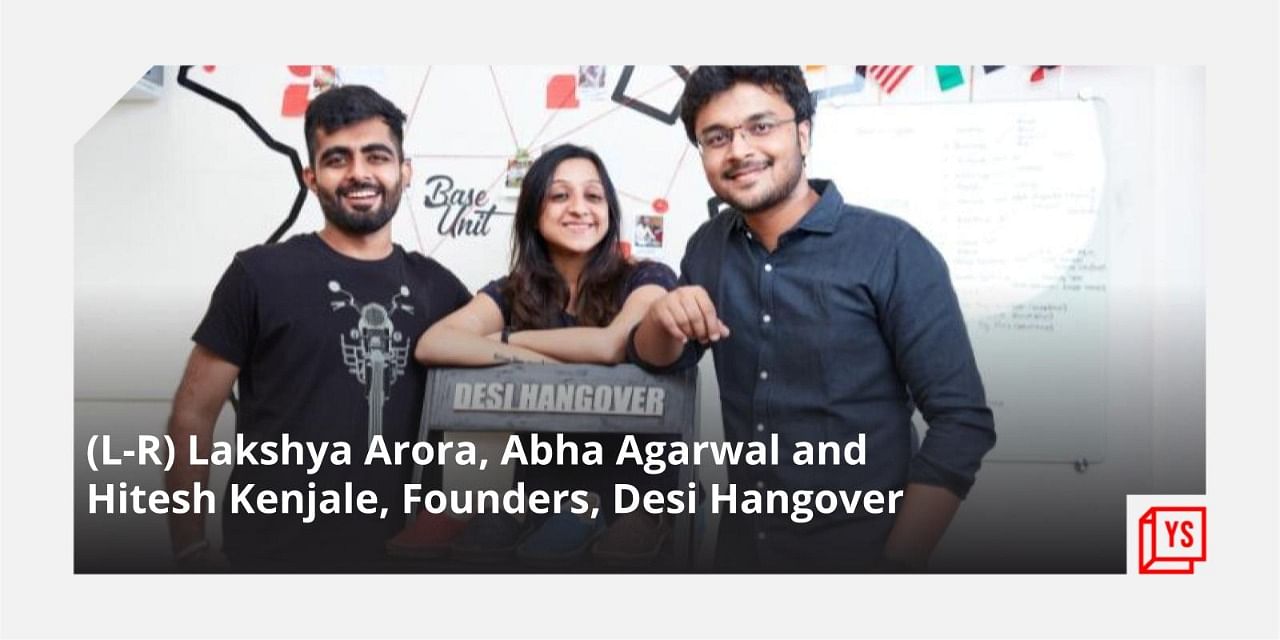Gone are the days when people were not very aware of the products they use. But today, consumers are making conscious decisions and are moving towards sustainability.
Even the footwear industry is moving towards being environmentally friendly, and Mumbai-based startup Desi Hangover is working to make such products available for the consumer, and in the process is uplifting the lives of artisans.
Founded by Hitesh Kenjale, Lakshya Arora, and Abha Agarwal in 2014, the direct to consumer (D2C) footwear brand has gone through the full circle of running a profitable operations, taking a hit due to the Covid-19 pandemic, and emerged stronger with ambitious plans ahead.
At the same time, Desi Hangover is not working to establish an Indian footwear brand, but is also enriching the lives of the artisans as they are now earning much more than in the past.
Hitesh says, “We started up to help the artisans who are part of the footwear making process and help them generate a lot of value.”
Being environment friendly
The startup was clear right from the beginning that its products would be environmentally friendly and that it would follow an ethical process.
This means, the leather hide for the footwear is sourced from animals that die due to natural causes, and the leather is treated with vegetable tanning process.
“Customers used to ask about the colour of our footwear, and we told them that it is due to the use of natural ingredients like turmeric, which was appreciated by them and this worked out in our favour,” says Abha.
The founders built networks within the ecosystem to source the leather and to connect with artisans who use the traditional and environmental-friendly methods to make the footwear. They later started selling these products at various exhibitions across the country like Soul Santhe in Bengaluru and Kala Ghoda in Mumbai.
“We saw there was an audience that was looking for such kind of footwear and realised it has a market potential,” says Hitesh.
The footwear products of Desi Hangover
Desi Hangover started showcasing its products at these exhibitions and found decent traction, and registered a revenue growth of 80 percent annually, besides being operationally profitable. This went on for around four odd years and also had to depend on loans from banks for running their business.
It was during this time the company started getting a lot of enquiries from other retail chain owners as well as distributors for its products and placed its brand of footwear within these outlets. At the same time, it decided to foray into setting up an independent retail route, but this proved to be a costly affair as the cost of running such an outlet was much more than the revenue it could generate.
The other hit the startup had to take was the impact from the Covid-19 pandemic, where it could not market its products at offline locations. However, this was also a period when the online buying route was becoming more stronger and this worked in its favour as it was already a well-known brand, with both offline and online formats.
Lakshya Arora says, “The concept we offered could not be sold easily digitally as the buyer will most probably purchase through the offline route for the first time and subsequently shift online.”
The market and funding
Initially a bootstrapped venture, Desi Hangover recently raised $180k in its first seed round of funding from Social Alpha, CIIE.co, and Be An Angel Network. The founders believe it is an endorsement of their sustainability business model. This investment will be primarily used for various growth initiatives.
According to the founders, the revenue has now gone back to pre-Covid levels with the same growth rate.
The footwear brand has priced products in the range of Rs 2,500-Rs 3,000 and says it does not have any direct competition for the kind of products it makes. However, it sees other established footwear brands as its immediate competition.
The artisans who are part of Desi Hangover network
According to India Brand Equity Foundation, India is the second largest consumer of footwear globally with a market size of $12 billion. The organised segment of this market is about 30 odd percent with the rest being with the unorganised sector.
According to Abha, it would be challenging to replicate the process that Desi Hangover goes through to come out with an ethical and environmentally sustainable footwear brand.
Larger goal
The larger goal for the startup is to provide a sustainable livelihood for artisans who are involved in making this footwear and whose earnings were unpredictable due to lack of demand. It is engaged with one such cluster in Athani in Belgaum district of Karnataka and around 111 families are part of this startup’s network.
Hitesh says, “The artisans we work with have seen their earnings grow 2.7x and they are now part of a professional organisation where there is predictability of income.”
As part of its future plans, Desi Hangover will continue to focus on the India market though its products have found buyers in places such as Singapore, Malaysia, Dubai, and the United States.
The founders believe India needs to have an ethnic shoe brand where consumers are comfortable wearing semi formal footwear even in office environments.
Desi Hangover aims to build a strong connection with the entire ecosystem, which means strengthening its online presence, extending its retail partnership, and enhancing the business to business network.
The startup also had a few learnings in the entire process. Firstly, there needs to be a strong focus on cash cycles in the business; secondly, the artisan community has a strong potential in the country; and lastly, this can be replicated in other industries also.
“Our goal is to use the skill of the traditional artisan to come out with products which can be sold in the modern market,” says Hitesh.










